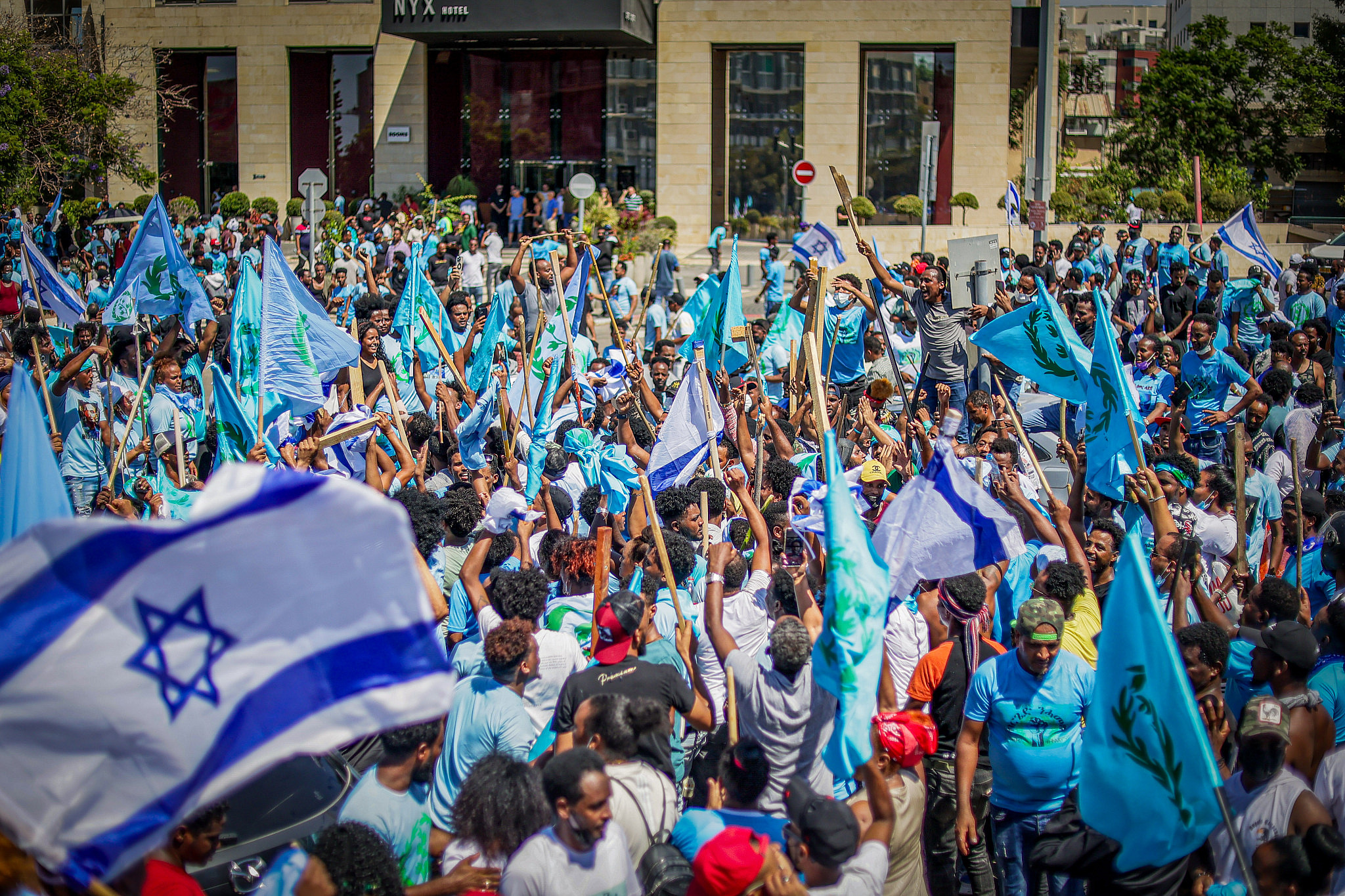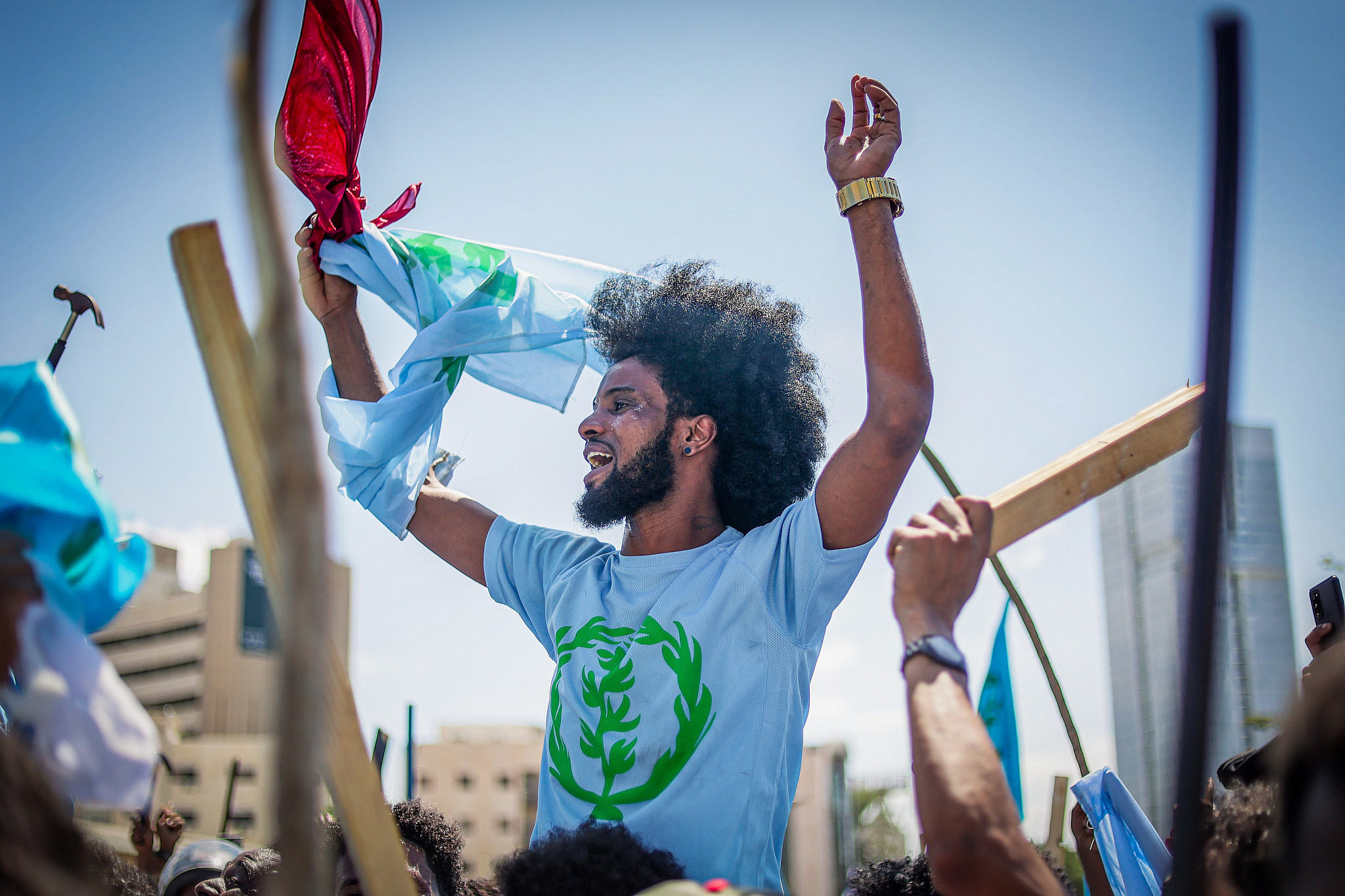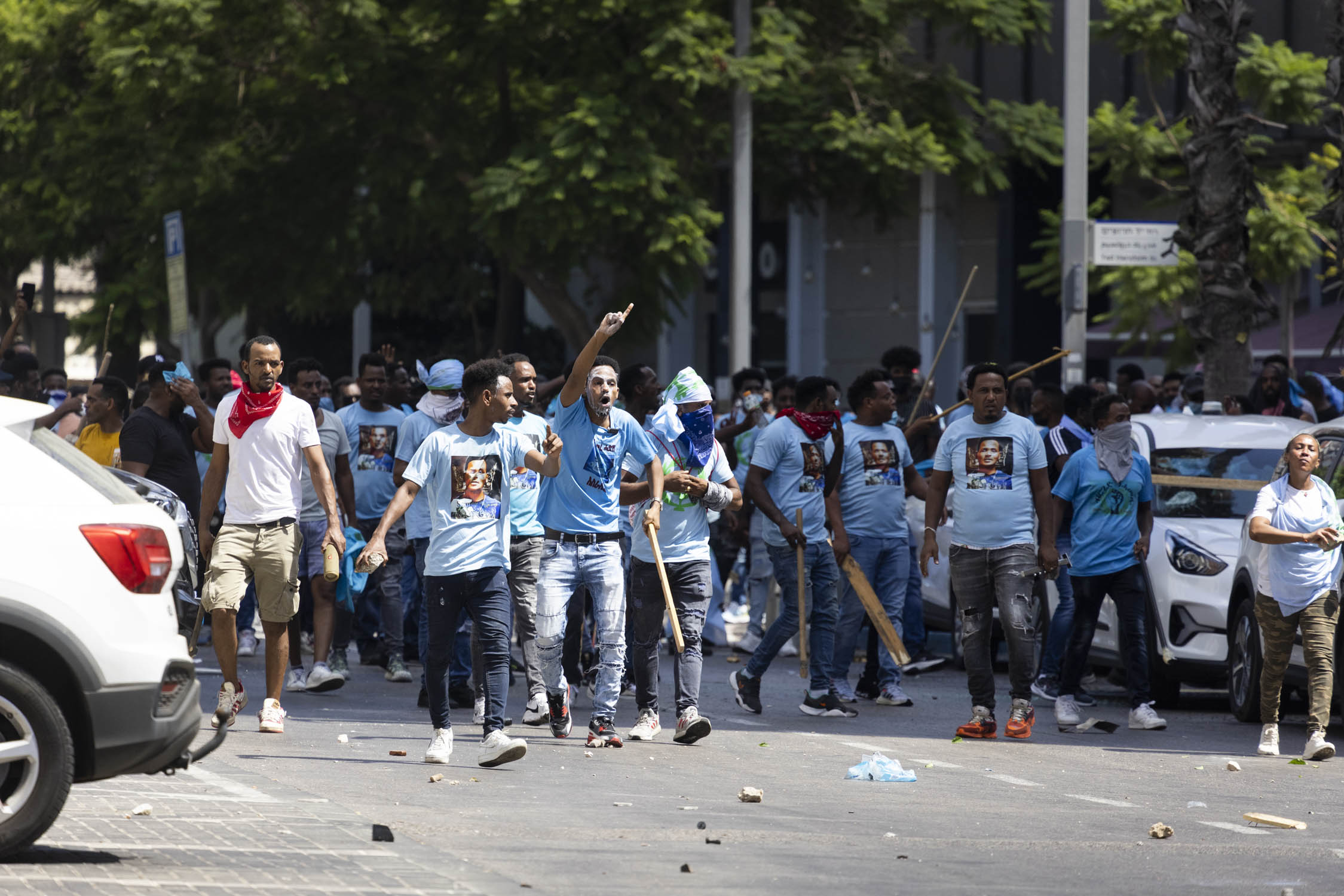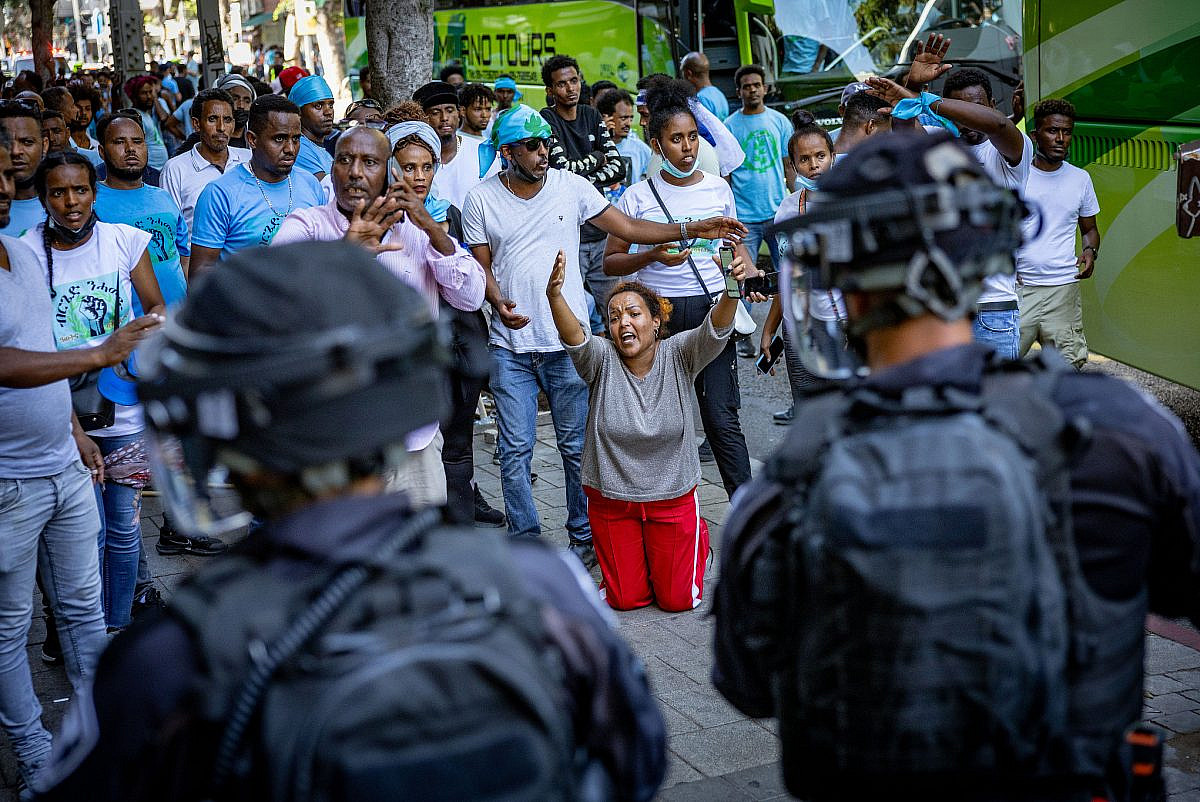Saturday’s riots among the Eritrean asylum seeker community in south Tel Aviv were many years in the making. The incident — in which supporters and opponents of the Eritrean regime clashed at an official Eritrean government event, and drew live ammunition as well as tear gas and shock grenades from Israeli police — prompted opportunistic condemnations from right-wing Israeli politicians. But the police have long refused to prevent government agents of the Eritrean dictatorship from terrorizing, blackmailing, and sometimes physically attacking asylum seekers in Israel; therefore these protests were, above all, a desperate attempt by the community to protect itself.
The general Israeli public does not know that the Eritrean community in Israel lives under double persecution: on the one hand, by successive right-wing governments in Israel, and on the other, threats by government agents in Eritrea. Now, when things have spiraled out of control, the Netanyahu government, the most extreme in Israeli history, is once again threatening asylum seekers with deportation — a blatantly undemocratic and illegal move. But the government’s incitement hides the fact that the riots broke out precisely because of the long-standing policy of the Israeli authorities, which protects agents of the Eritrean regime.
In 2019, Amnesty International published a report on the long reach of the People’s Front for Democracy and Justice (PFDJ), the ruling and sole legal political party in Eritrea, and the way it extorts refugees who have fled the country. The report focused specifically on Eritrean agents operating in Kenya, but noted that agents are operating out of Eritrean embassies in other countries as well.
Over the past few years alone, embassy agents in Switzerland infiltrated human rights organizations in order to gather intelligence about the local Eritrean community, to threaten them, and possibly also to report false information to the Swiss government about regime opponents, with the aim of preventing them from receiving refugee status. The Eritrean embassy in South Africa was involved in the suppression of Eritrean student unions in the country, which were critical of the regime. In the Netherlands, supporters of the Eritrean regime have been threatening supporters of the opposition in the country. There are many more such stories from all over the world. In this respect, at least, Israel is not the exception.

Giving regime agents free rein
In Israel, the agents of the regime blackmail Eritrean asylum seekers in different ways. They prevent refugees from sending money to their families, threaten to confiscate property left behind in Eritrea, refuse to provide regime opponents with consular services at the Eritrean embassy, and threaten those who criticize the Eritrean government on social media that their relatives back home will be thrown into prison. In extreme cases, regime agents also threaten prominent activists, and even physically attack them.
There are two main reasons for the international persecution led by Isaias Afwerki, the dictator of Eritrea. The first is simple: money. Afwerki extorts money and transfers resources from poor refugees around the world to his impoverished government, via the 2 percent tax it levies on Eritreans living abroad. The second reason is, of course, political oppression. The persecution is targeted at opposition activists and is intended to prevent them from acting against the dictatorship in Eritrea.
These things are true almost everywhere, but in Israel they are particularly so. Only in Israel do Eritreans live as asylum seekers who, unlike in the rest of the world, are barred from receiving refugee status. For many years now, the Israeli government has refused to examine their asylum applications, thus forcing them to live under a temporary visa, a situation that leaves them restricted and with little protection.
In addition, and unlike the situation across the world, Israel turns a blind eye to the activities of the regime’s agents and allows them to do whatever they want — including public, provocative, and terror-inducing events. Refugee aid organizations and prominent activists in the asylum seeker community had repeatedly warned that a violent clash was expected during Saturday’s event, which was organized by regime agents, yet the police ignored the warnings.

Furthermore, refugee aid organizations have been reporting on the actions of the regime’s agents for years, but the authorities have shown clear indifference. I myself tried to help N., a dissident of the Eritrean regime who was repeatedly threatened by its agents. They sent him text messages, scared his relatives, and even twice attacked him with knives in south Tel Aviv. I received a text message from the police that the investigation into the matter was closed. N. lives in constant fear, forced to repeatedly change his phone number, avoid using certain streets, and keep his identity a secret, so as not to expose his family to harm.
In 2020, the Eritrean embassy in Israel reportedly bailed out an Eritrean “asylum seeker” who was arrested during a brawl between regime dissidents and supporters. There is no reason for the Eritrean government to bail out an asylum seeker in the diaspora. One can assume that the embassy did not release him out of generosity, but because he may have been one of their agents. The Israeli police, the Population and Immigration Authority, and the court that released the man did not find anything strange in this conduct.
The entire Eritrean community in Israel knows where the agents’ headquarters is located. Some of them lived in the same building until recently, which also has a small nightclub at the entrance. For years, the agents went out there to threaten dissidents, and all the Eritreans I have met knew not to pass by this building on national holidays, when the regime’s supporters wreak havoc in the streets of south Tel Aviv. The police have repeatedly ignored this. Curiously, the lawyer who represents the regime supporters who participated in Saturday’s clashes also represents the Eritrean embassy.
In other countries with a significant Eritrean refugee community, such as Canada, local governments have banned mass events on behalf of the embassy both for fear that fights may break out, as well as to protect the persecuted community. In Sweden and Germany, fights broke out after similar events. In Israel, the police received all possible warning signs from the community leaders, and should have known in advance that celebrations by the regime’s supporters would end in disaster. Yet for some reason, they allowed the celebrations to take place.

There are three potential reasons for why Israel allows this situation to persist. The first is that it is afraid to deal with the regime agents, since their imprisonment or deportation will force the government to start genuinely reviewing the asylum applications of other Eritreans living in the country, in order to try and decipher who is an agent and who is not. This would potentially grant the vast majority of the Eritreans in Israel — the non-agents — a refugee status, which Israel tries to avoid at all costs.
The second is that Israel may have agreements with Eritrea to allow its agents to operate inside its territory. While almost the entire world has imposed sanctions on Eritrea’s totalitarian dictatorship, Israel sells arms to the regime, and thus has economic interests in allowing its emissaries to operate within its borders.
But the actual reason may be more prosaic. Perhaps the police simply do not care about Eritreans attacking each other. And really, why should they care: not only do Eritreans not have status here, they are Black. As long as they do not interfere with the daily life of the Jews in Tel Aviv, fights between Africans are of no interest to anyone.
An uprising by an oppressed community
Eritrea is recognized as one of the cruelest dictatorships in the world. When it comes to freedom of expression, freedom of the press, or freedom of movement, the country has been placed toward the bottom of global indices for years. Eritrea’s system of forced conscription has prompted researchers to debate whether, legally-speaking, it actually constitutes a system of forced labor, or a system of slavery.
Most read on +972
This “military service,” which has nothing to do with regular military duties, can be unlimited, such that Eritreans are forced to “serve” the regime for decades without pay and with only a few vacation days a year. The Eritrean regime uses mass torture, arrests without trial, disappearances, and secret executions. The government is trying to wipe out certain ethnic and religious minority groups, such as the Kunama people and Pentecostal Christians. The Eritreans in Israel who risked their lives to flee this horror arrived on foot, via a route that passes through Sudan and Egypt, two unsafe countries for African refugees. Israel is the first relatively safe place they have come across. Many of them were tossed into south Tel Aviv by the government upon their arrival.
This weekend’s violent events in Tel Aviv were, first and foremost, an uprising by an oppressed community against its oppressors. Instead of protecting refugees as required by the 1951 Refugee Convention, the police and the government are allowing the ongoing persecution of Eritreans in Israel. When they rebel against this persecution, the police open fire on them. The solution to the issue of Eritrean refugees has been clear for years: instead of persecuting the opposition, the state should recognize them as refugees, and those who are agents of a dictatorial totalitarian state, whose sole purpose is to immiserate the lives of actual asylum seekers, should be the ones deported back to their country.
This article was first published in Hebrew on Local Call. Read it here.





